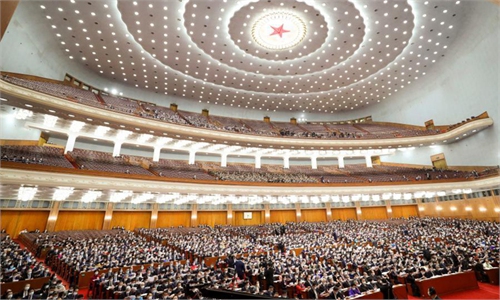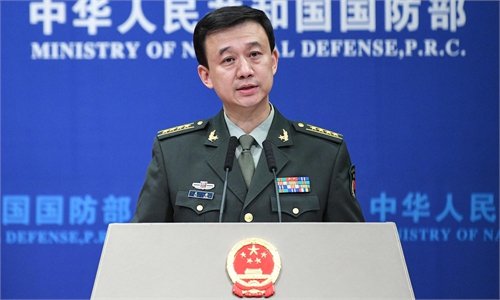
Illustration: Xia Qing/GT
The meeting of the China's legislative bodies, the National People's Congress (NPC) and the consultative body, the CPPCC, should have garnered a lot more serious attention from the rest of the world this year. As the world is just beginning to get a handle on the COVID-19 pandemic, China has really succeeded in overcoming the virus, and has done it with a positive growth rate for the year 2020. This means that China can hit the ground running economically while most of the world still must first introduce a control regime in order to prevent the spread of the epidemic.
For China, this is a particularly important year, over and above the victory over COVID-19. It is the year in which the poverty alleviation campaign can declare victory over poverty. It is also the beginning of the 14th Five-Year Plan (2021-25), which will determine the shape of this country for decades to come. It includes a most ambitious program for creating an innovation-driven economy. And by placing scientific innovation at the heart of China's development, it will ensure rapid economic growth for some time to come. There will be no "middle-income trap" for the People's Republic of China.
And it is also the 100th anniversary of the founding of the Communist Party of China, the political governing entity which has raised the country from an impoverished, and predominantly agricultural nation into the second biggest economy in the world. It has become the center of world manufacturing, and, in several sectors, the leading producer of high technology products.
For this reason, the revival of China's economic growth can provide the impetus for the world economy, which is still in the throes of the pandemic. One of the key messages coming out of the meetings is that China will open up even more to foreign investment. While it is placing more emphasis on the domestic economy as the real growth-driver, largely because of the uncertainties engendered by the negative campaign of propaganda being waged in the West against China, it will not close itself off, but rather open the door wider. And, judging from the increasing foreign direct investment in China, many foreign companies are doing just that - to their great benefit.
While the biased Western media depicts the two sessions as either a "political show" or a political "black box operation," the two sessions are in fact very public and very transparent and involve rather intensive, and at times, heated, discussions among the participants. In fact, much of the discussion and deliberation has been initiated long before the members arrive in Beijing for their week-long "pow-wow." Indeed, with the proliferation of new communications in this COVID-19 era, members have even had many more on-line discussions regarding the many issues that will be on the table during the sessions.
And while the viewing public generally only takes note of the formal press conferences where final results are reported, there is a multitude of opportunities for the press covering the sessions to effectively interview members. Even now, with COVID-19 restrictions, they can interview them with appropriate social distancing or over the internet. Over 10,000 proposals on a whole myriad of social, political and cultural issues have been placed on the table by members of the NPC and the CPPCC.
All of these are then circulated and discussed before decisions are made with regard to implementing, or rejecting them. Far from being a "rubber-stamp parliament" as some Western media would have it, the two sessions embrace an extensive discussion of almost all the major issues affecting society and the people - and is literally done by thousands of people.
Here are some takeaways from this year's two sessions. According to the Government Work Report, China is predicted to have an over 6 percent growth rate next year and will create 11 million urban jobs, providing a ray of hope for countries who still have to reverse the negative downturn of the previous year. China's success in poverty alleviation will be followed up by an ambitious program of rural revitalization in order to make sure that poverty never returns. This will be a lesson with great appeal in Africa, Asia and Latin America, where countries are still struggling with extremely high rates of poverty. And China will continue to exert its efforts in providing high-quality development with the Belt and Road Initiative, bringing more development opportunities to the world.
And the science program of the new five-year plan is far more ambitious than any yet put forward. With its implementation, the entire nation will become a veritable "hothouse" of innovation in which many of those problems now faced by humanity in areas of medicine, energy, food preservation, and longevity can readily be addressed with new solutions. This will not only be a benefit to China. It will be for the benefit of all mankind.
The author is a Washington political analyst and a non-resident Fellow of the Chongyang Institute for Financial Studies. opinion@globaltimes.com.cn


